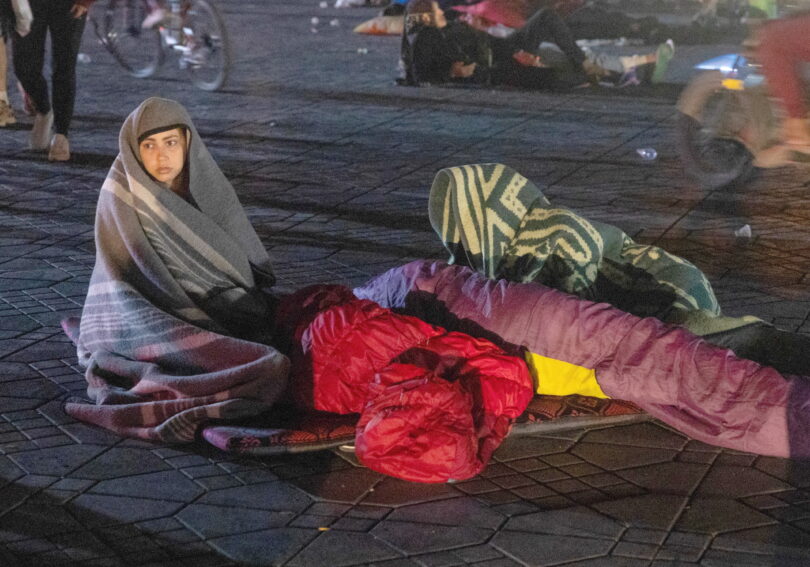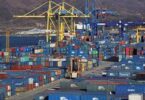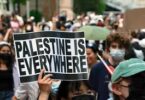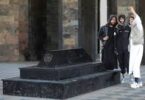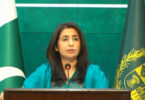MOROCCO (Agencies): The death toll from the powerful earthquake that struck Morocco has spiked to 1,037, state television quoted the Interior Ministry as saying on Saturday, resulting in extensive destruction and prompting frightened residents and tourists to seek safety in the middle of the night hastily.
The quake struck Morocco’s High Atlas mountains late on Friday night, damaging historic buildings in Marrakech, the nearest city to the epicentre, while the most badly affected areas were in the mountains nearby.
The Interior Ministry said 1,037 people had been killed and another 672 injured by the quake, gauged by the US Geological Survey (USGS) at a magnitude of 6.8 with an epicentre some 72 km (45 miles) southwest of Marrakech. In the village of Amizmiz near the epicentre, rescue workers picked through rubble with their bare hands.
“When I felt the earth shaking beneath my feet and the house leaning, I rushed to get my kids out. But my neighbours couldn’t,” said Mohamed Azaw. “Unfortunately no one was found alive in that family. The father and son were found dead and they are still looking for the mother and the daughter.” About 20 men including firefighters and soldiers in fatigues stood atop the ruin of a house in Amizmiz as they tried to remove rubble, bits of carpet and furniture protruding from gaps between pancaked concrete floors.
The quake, which hit at around 11 p.m. (2200 GMT), affected a sweep of the High Atlas mountain range. Tremors were felt as far away as Huelva and Jaen in Andalusia in southern Spain, Spanish television RTVE reported. Street camera footage in Marrakech showed the moment the earth began to shake, as men suddenly looked around and jumped up, and others ran for shelter into an alleyway and then fled as dust and debris tumbled around them.
“Our neighbours are under the rubble and people are working hard to rescue them using available means in the village,” said Montasir Itri, a resident of the mountain village of Asni near the epicentre.
The nearest big city to the epicentre is Marrakech, where several buildings — including a UNESCO World Heritage site — collapsed in the old city. Moreover, internet connectivity was disrupted in Marrakesh due to power cuts in the region, according to global internet monitor NetBlocks. US Geological Survey (USGS) said that “the population in this region lives in structures that are highly vulnerable to earthquake shaking.”
USGS said: “The epicenter of the earthquake was at a relatively shallow depth of 18.5 km (11.5 miles) and occurred about 72 km (44 miles) southwest of Marrakesh and 56 km west of the Atlas Mountain town of Oukaimeden at just after 11pm local time (2200 GMT).” Morocco experiences frequent earthquakes in its northern region due to its position between the African and Eurasian plates.
“We felt a very violent tremor, and I realised it was an earthquake,” Abdelhak El Amrani, a 33-year-old in Marrakesh, told AFP by telephone. “I could see buildings moving. We don’t necessarily have the reflexes for this type of situation. Then I went outside and there were a lot of people there. People were all in shock and panic. The children were crying and the parents were distraught.”
“The power went out for 10 minutes, and so did the (telephone) network, but then it came back on. Everyone decided to stay outside,” he added. Frenchman Michael Bizet, 43, who owns three traditional riad houses in Marrakech’s old town, told AFP that he had been in bed at the time of the quake.
“I thought my bed was going to fly away. I went out into the street half-naked and immediately went to see my riads. It was total chaos, a real catastrophe, madness,” he said. Video circulating on social media showed part of a minaret collapsed on the famous Jemaa el-Fna square in the historic city, injuring two people.
Fayssal Badour, another Marrakesh resident, told AFP he was driving when the earthquake hit. “I stopped and realised what a disaster it was. It was very serious, as if a river had burst its banks. The screaming and crying was unbearable,” he said. The interior ministry said authorities have “mobilised all the necessary resources to intervene and help the affected areas”.
Hospitals in Marrakesh reportedly saw a “massive influx” of injured people. The regional blood transfusion centre in Marrakesh has called on residents to donate blood for those injured. In the town of Al-Haouz, near the epicentre of the quake, a family was trapped in the rubble after their house collapsed, local media reported.
It was also felt in the coastal cities of Rabat, Casablanca and Essaouira. “We heard screams at the time of the tremor,” a resident of Essaouira, 200 kilometres west of Marrakesh, told AFP. “People are in the squares, in the cafes, preferring to sleep outside. Pieces of facades have fallen.”
USGS’s PAGER system, which provides preliminary assessments on the impact of earthquakes, issued an orange alert for economic losses, estimating significant damage is likely. Past events with this alert level have required a regional or national-level response, according to the US government agency.
USGS said that “the population in this region lives in structures that are highly vulnerable to earthquake shaking”. Moroccan media reported it was the most powerful earthquake to hit the country to date. The earthquake was also felt in neighbouring Algeria, where the Algerian Civil Defence said it had not caused any damage or casualties.
In 2004, at least 628 people were killed and 926 injured when a quake hit Al Hoceima in northeastern Morocco. The 1980, the 7.3-magnitude El Asnam earthquake in neighbouring Algeria was one of the largest and most destructive earthquakes in recent history. It killed 2,500 people and left at least 300,000 homeless.

